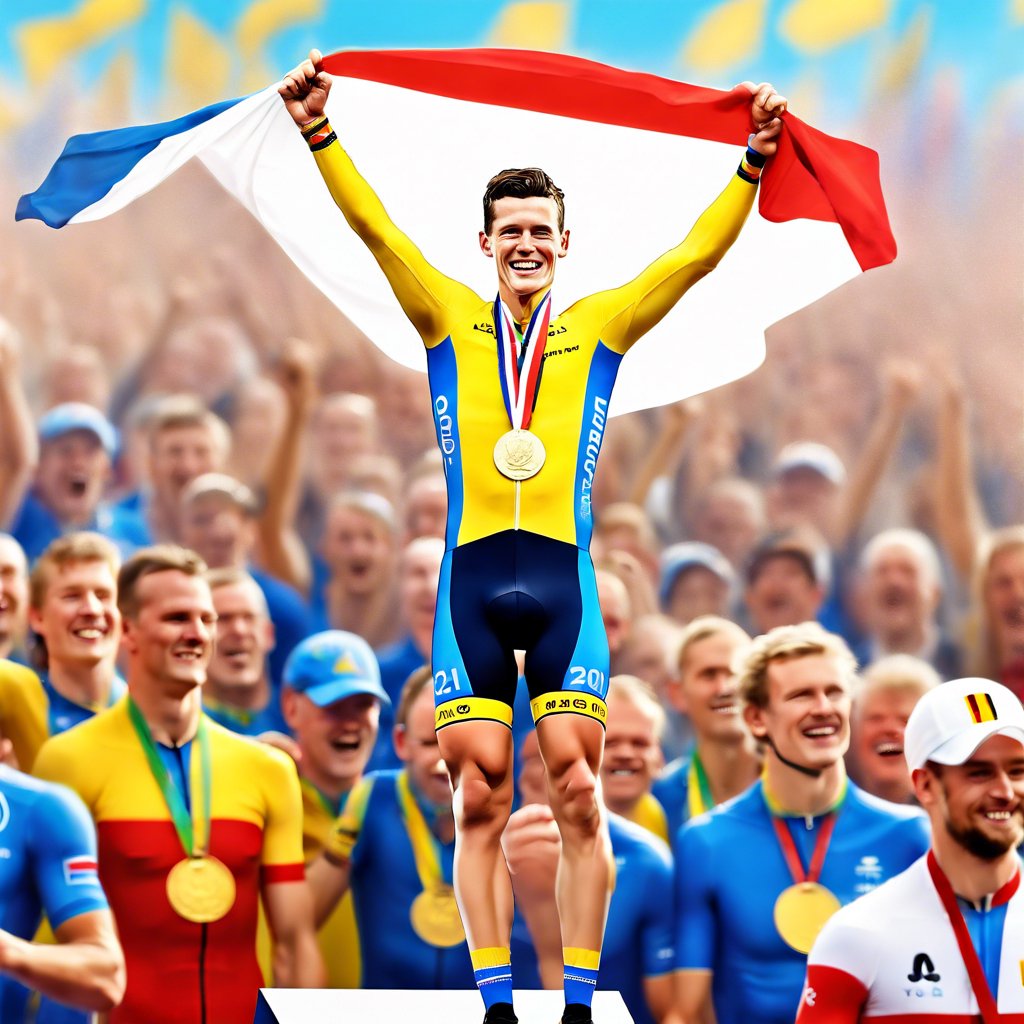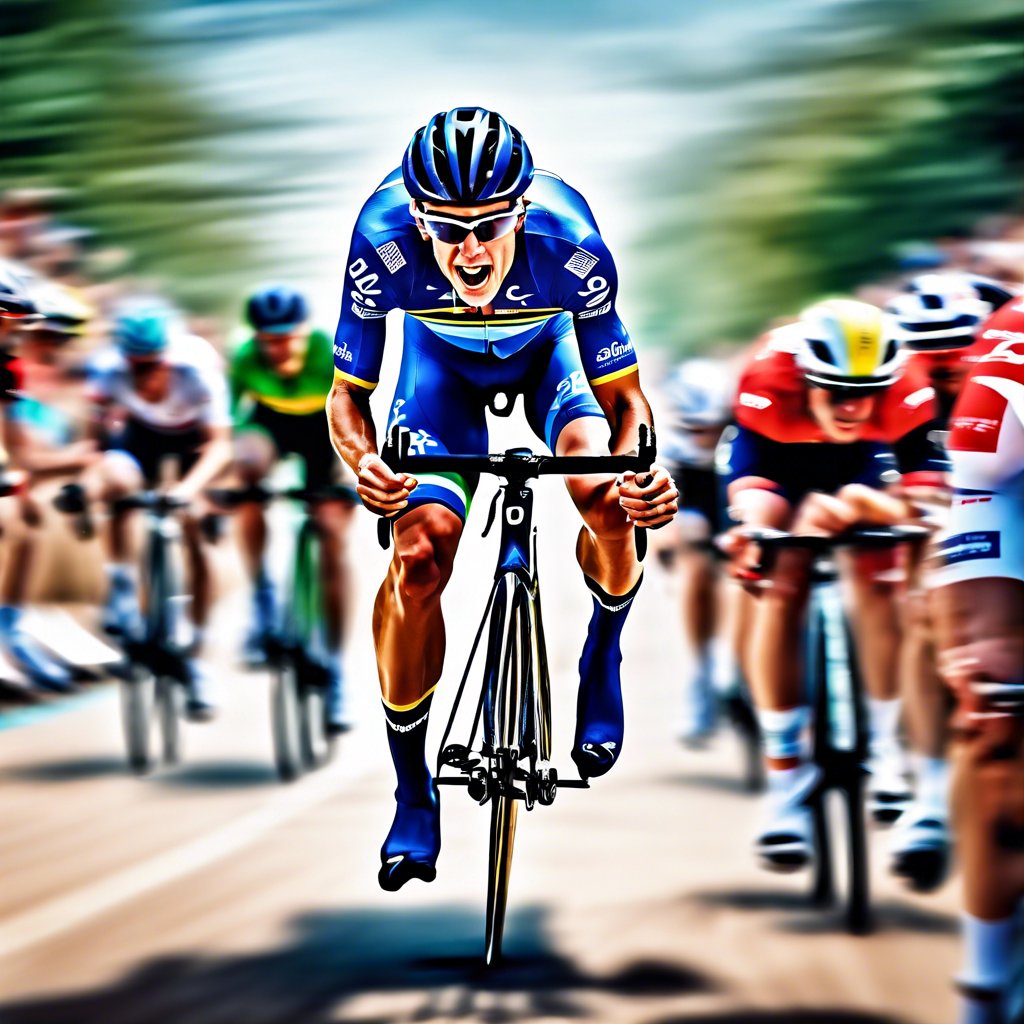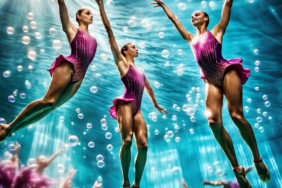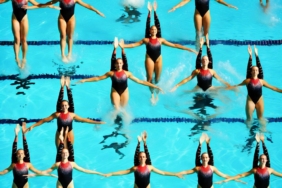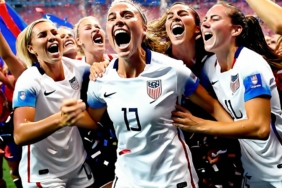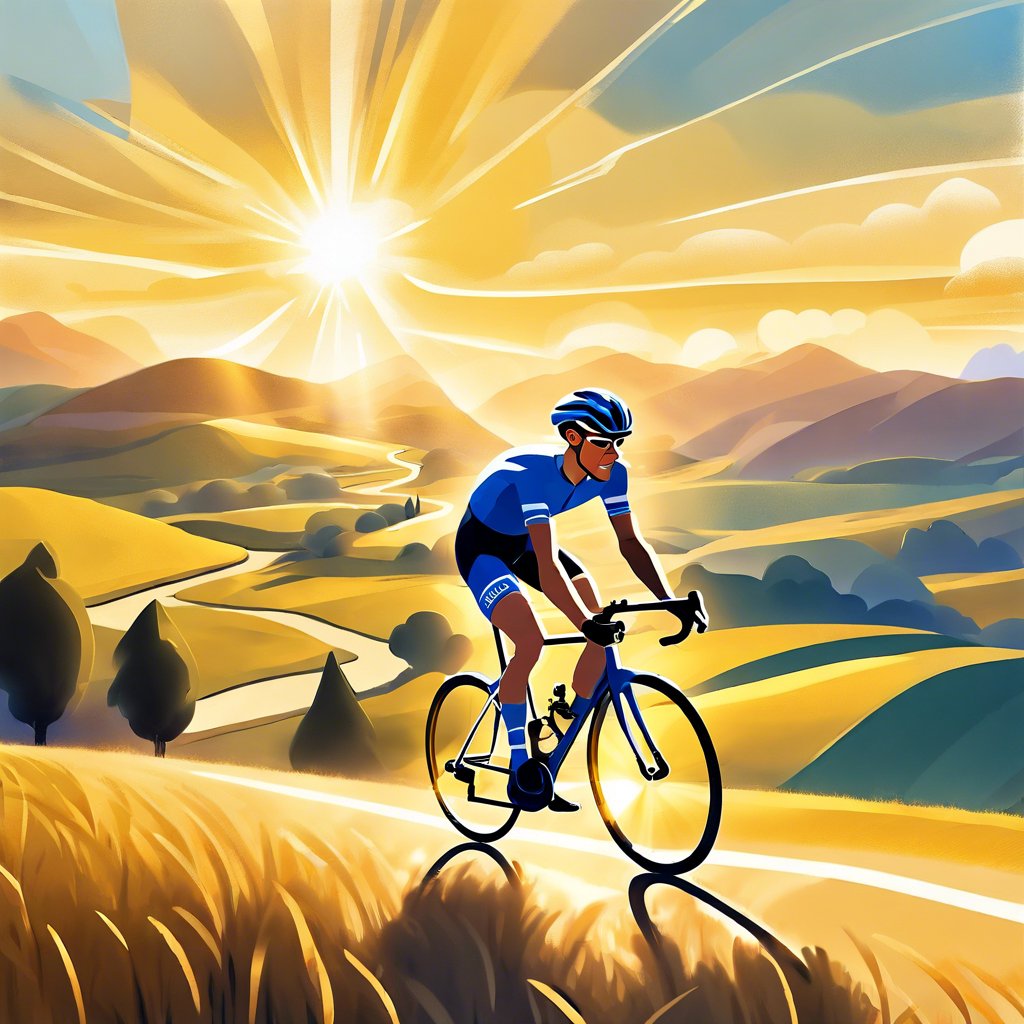The Unprecedented Triumph of Remco Evenepoel at the Olympics
This summer, Remco Evenepoel accomplished a feat that had never been achieved before — he clinched gold medals in both the time trial and the road race at the same Olympic Games. The 24-year-old Belgian cyclist competed just six days after finishing third in his inaugural Tour de France, which is regarded as cycling’s most prestigious event, spanning a grueling 21 stages and nearly 3,500 kilometers (over 2,100 miles). Despite the fatigue in his legs, the desire for gold fueled his determination.
As he crossed the finish line of the road race last Saturday, dismounting his bike to pose in front of the iconic Eiffel Tower in central Paris, he delivered an image that will be etched in the annals of cycling history, complementing his second gold medal. However, this moment was not entirely new to him; it stemmed from a process of visualization that began during one of his most challenging periods. This was after a horrific crash at the Italian one-day race, Il Lombardia, in 2020, where Evenepoel was thrown off a bridge into a ravine while descending at high speed. He suffered a fractured pelvis and a bruised lung, but he was fortunate to escape with his life.
“When I had my crash, I began to focus on visualization training,” Evenepoel shared with The Athletic. “It was primarily to rebuild my confidence in descending and cornering after that incident. I started applying it to more aspects of my racing, so now, I always envision myself crossing the finish line victorious.”
He recounted how the idea of celebrating his victory came to him the day before the race while on the massage table, experiencing a moment of complete relaxation with his soigneur, a non-riding team member. “We discussed how incredible it would be to finish alone, creating an unforgettable image—perhaps one of the most beautiful pictures of my career. That’s when it truly resonated with me. Naturally, I kept it to myself; I think only my soigneur was aware of it.”
A Journey Through Adversity and Triumph
In April 2024, during stage four of the Tour of the Basque Country, Evenepoel found himself lying in the woods of northern Spain, having lost control on a treacherous descent while traveling at over 80 km/h (50 mph). His Danish rival, Jonas Vingegaard, was in even worse shape, lying in a drainage culvert further up the road. With just three months remaining until the Tour de France and four until the Olympics, Evenepoel faced uncertainty about his future in competitive cycling.
“I suffered a broken collarbone and scapula,” Evenepoel explained. “It was a nerve-wracking time: ‘Would I be fit for the Tour?’ Initially, we hoped for a top-five finish, but deep down, I aspired for a podium spot.” He described the intense rush to regain his fitness, especially since he tends to gain weight easily—not just in fat, but also in muscle. “During the three weeks of inactivity, I put on about two kilos (around 4.5 pounds). Restarting training was particularly challenging.”
However, everything went smoothly during the Tour de France. “I aimed to win a stage and finish on the podium. It felt like a job well done—honestly, it was unexpected to have such a smooth Tour, particularly for my first experience.” Evenepoel won stage seven, a time trial in the picturesque countryside south of Dijon. This victory marked his achievement of winning a time trial in all three Grand Tours, the others being in Italy and Spain. Yet, his primary time trial goal for the summer loomed ahead on July 27 in Paris.
“The six-day turnaround was not much,” he noted. “After finishing a Grand Tour, you lack the acceleration in your legs, but you can push a bigger gear. However, that acceleration is essential for a time trial like this.”
On the morning of the time trial, heavy rain fell. “I woke up feeling more apprehensive than usual. There were fast, technical corners, and with the slippery roads in Paris, I knew it would be tricky. I didn’t have much experience with time trials in the rain; my only previous attempt was at the (2023) national championships, where I crashed after three kilometers. Not the best memory to carry into this.” Evenepoel finished fourth that day, but the rain posed a significant challenge.
Adapting to the Conditions
Cycling is a delicate balance of man and machine, with riders meticulously adjusting their bike specifications. The French rain introduced another layer of difficulty for the Belgian team. “We lowered the tire pressure quite a bit,” Evenepoel explained. “I was riding at about 5.5 bar, which is still relatively high, but in time trials, we usually go for higher pressure. If you ride tubeless, you can drop to 4 or even 3.8 in wet conditions, but I use Specialized tires with inner tubes, and I didn’t want to sacrifice our low rolling resistance.”
Due to the pouring rain, Evenepoel opted for a warm-up indoors on static rollers rather than outside on his time-trial bike. He also switched from his usual black visor to a clear one for better visibility. With 32.4 kilometers (20 miles) to cover as quickly as possible, nutrition became crucial. “We call them pistolet in Flemish,” he laughed while trying to describe his pre-race meal. “They’re small, round French baguettes, also popular in Belgium. I usually have three—two with raspberry jam, which is always raspberry, and one with chicken, along with about half a liter of Fanta.”
Evenepoel’s coach had secured an Airbnb just 50 meters from the start gates, allowing the team to relax for nearly two hours before the race. “Unfortunately, the slushie machine wasn’t functioning well, so I had to settle for a more liquid isotonic drink instead of my usual slushie to help manage my core temperature.”
Despite the challenges, Evenepoel’s primary focus at the start of the race was to avoid sliding out on corners. “I’ve always had a powerful engine, but compared to some rivals who have been competing at a high level from a young age, my bike-handling skills can sometimes be a disadvantage. I only transitioned from football to cycling at 17.”
Strategic Racing and Sweet Victory
“I made an effort to push aside the negative thoughts about the rain and concentrated on the straight sections, where I could exert maximum effort,” Evenepoel recounted. “In the nationals, I made the mistake of leaning my bike too much, so this time, I used the corners as recovery moments to breathe and replenish oxygen in my legs.” His strategy paid off. Evenepoel not only had the fastest time in the highly technical mid-section of the race but also outpaced his teammate Wout van Aert, who was expected to excel in that part of the course.
As he approached the final few hundred meters, Evenepoel’s lead was comfortable enough for him to indulge in a rare moment of celebration during a time trial. “We had our own time checks at five kilometers and again with five kilometers to go,” he explained. “When I received the first time check, I had an eight-second advantage, but I think my team kept it low-key and only told me two seconds. It was a motivating push. By the second check, they informed me that (Italian rider Filippo) Ganna had lost considerable time. I realized the trickiest parts were behind me, and the finish line was straightforward.”
As he drew closer to the finish line, Evenepoel could see his time remaining in green, with Ganna’s name preceding it. “At that moment, I thought: ‘This is mine.’ My team could see the television images and started shouting: ‘You’ve got it, you’ve got it!’ It was an explosion of emotions.”
In the aftermath of this historic win, marking Belgium’s first medal of any kind at the 2024 Olympics, a single mishap occurred. “Wout (who finished third) was also on the podium, and we had a specific set of clothing we were supposed to wear. Unfortunately, Wout brought the incorrect set, so I had to lend him my jacket and find another one to wear.”
A Unique Celebration and Future Aspirations
A close examination of Evenepoel’s two gold medal presentations reveals a subtle but significant detail. Despite the seven days that separated the two races — filled with recovery and preparation for the road race — there was also the prospect of another medal opportunity. Due to poor water quality in the River Seine flowing through Paris, organizers of the Olympic triathlons considered eliminating the swimming portion, potentially creating a duathlon. “That would have been something special,” he chuckled. “I’m not sure if it’s allowed for professional cyclists, but one day, after I’ve checked all the boxes in cycling, I plan to participate in Ironmans (long-distance triathlons) or triathlons. I believe age is less significant in Ironman since it’s not as explosive — plus, it would help me manage my weight. It would have been remarkable to have three medals, but I also recognized it might have hindered my performance.”
When asked if he had now ‘completed’ time trialing, Evenepoel confidently replied, “I’ve done it all. I became national champion, European champion, World champion, and now an Olympic champion — and I have a time trial victory in every Grand Tour. It feels like I’ve reached a significant milestone.”
“At the start of my career, I knew I had the potential to achieve something special in time trialing, but I never expected to reach this level, especially after a Grand Tour when I’m considerably lighter than I would be for a World Championship. Compared to last year, I’ve shed about two kilos of pure muscle. It’s astonishing to have accomplished this while being relatively lightweight. If you look at the podium, it’s remarkable — I think Filippo and Wout weigh around 75 to 80 kilos, nearly 15 kilos more than me. It’s almost like I’m defying the science.”
As the Olympics approached, the men’s road race on August 3 would see 88 riders tackle a 273-kilometer course. This distance surpassed any typical single stage in a Grand Tour, and with smaller teams (Belgium fielded a maximum of four riders; smaller, lower-ranked countries had only a solo participant) and no radios to communicate with support staff, it represented a different challenge compared to the road races Evenepoel typically competed in for his trade team, Soudal Quick-Step. “I won the Olympics in this manner, so I genuinely enjoy it,” Evenepoel stated. “I’m still relatively close to my junior years, where this type of racing is more prevalent, so I’m somewhat accustomed to it. You need to read the race situation and feel it. If you’re not paying attention, you can easily lose track — but I thrive on the challenge.”
After analyzing the race profile online, Evenepoel initially doubted whether the course would suit him. However, a reconnaissance ride on the Wednesday before the race, covering 200 kilometers, revealed the challenging nature of the course. “When I felt my legs afterward, I understood it would be tough. That realization bolstered my confidence in my chances, especially with the undulating terrain leading into Paris. As fatigue set in, the explosiveness of some competitors would diminish. I’m fortunate that my explosiveness remains consistent, even when fatigued.”
“I told my masseur about this that night, focusing primarily on the climbs at Montmartre. I knew I needed to launch a significant attack there, where the race would become fully open for about five to six minutes due to the uphill, the tunnel, and then through the city section. What I executed in the race was precisely what I had envisioned.”
Typically, riders must be reactive in such races. However, with Van Aert tasked with marking rivals like the Netherlands’ Mathieu van der Poel, the race unfolded just as Evenepoel had hoped. He launched his attack at Montmartre with 38 kilometers remaining, bridging the gap to a breakaway group of three riders, which included leader Ben Healy of Ireland. Evenepoel’s relentless pace soon reduced the group to just himself and Frenchman Valentin Madouas.
“As we climbed Montmartre for the second time, with Madouas still on my wheel, I realized: ‘This guy is also having a great day; it’s not going to be easy to shake him.’ But once we began working together on the flat sections, I noticed my speed dropped significantly when he took the lead—going from about 53 kilometers per hour to 46 kilometers per hour. That made me suspect his legs were starting to tire.”
“On the next climb, I pushed up the pace to see how he would respond, and I could see he was losing ground but not completely falling apart. I urged him to take the lead, but he declined, and that’s when I knew I had to go all in to drop him — and it worked.” Now alone at the front, with the other riders behind him disorganized, Evenepoel was on track for another Olympic gold, barring any extraordinary circumstances. The extraordinary soon unfolded with just over three kilometers to go.
“My team car came alongside me, and (head coach) Sven was shouting: ‘You have one minute of an advantage; you have plenty of time, no worries.’ But then a race motorbike with a timing screen came alongside, displaying only 25 seconds. I was stunned: ‘How is this possible? I’m pushing it to the max and losing 35 seconds?’ I knew I was nearing a small cobbled section around the Louvre, but I think I hit a cobble on the side. Kurt Roose, my mechanic, later informed me that it was pretty much wrecked — there was a massive hole in the tire, and it exploded.”
“That’s why I felt anxious and panicked, because I thought: ‘I only have half a minute left. I need to get my replacement bike as quickly as possible.’ The spot where I punctured was just after a narrow tunnel, so my support team didn’t see me immediately. At that moment, it felt like an eternity — but when I reviewed it later, it was actually quite quick and smooth. ‘Not a bad sprint for a 51-year-old,’ Roose quipped afterward.”
The incident added an unexpected thrill to his victory. “It was chaotic, but also a unique image that will linger in people’s memories for a long time. The stress and rush were unnecessary, but it made the victory even more special.”
As Evenepoel completed his celebration at the finish line, no other rider had crossed yet. After a month of elite competition and with two gold medals adorning his neck, he was ready for a well-deserved break. Upon leaving the podium — and wearing the correct outfit this time — he celebrated at the Belgian Olympic house, dancing to trance music, fueled only by the caffeine still coursing through his veins post-race.
In the days following, he made an appearance at Anderlecht, the Belgian club in Brussels where he played youth football, alongside national cycling legend Eddy Merckx. The crowd chanted his name in admiration. On Saturday, he was gifted a gold-painted bike by Specialized.
Having won Belgium’s Sportsman of the Year award for two consecutive years, Evenepoel is undoubtedly a leading candidate for a third. “Nobody’s talking about my third-place finish in the Tour de France anymore,” he remarked. “You can clearly see that the Olympics, and particularly a double gold medal, surpasses everything. I discussed this with my wife as well. The week I spent at the Olympics, from Saturday to Saturday, with the two gold medals, what I accomplished in Paris will undoubtedly be the pinnacle of my sporting life.”
Could there be another extraordinary accomplishment awaiting him in Paris? “One day, if I find myself in Paris wearing the Tour de France Yellow Jersey, I believe the city will suit me perfectly,” Evenepoel reflected. “But for my first race in Paris? It’s certainly a great start.”
(Top photos: Getty Images; design: Dan Goldfarb)
